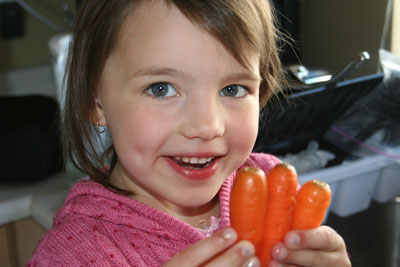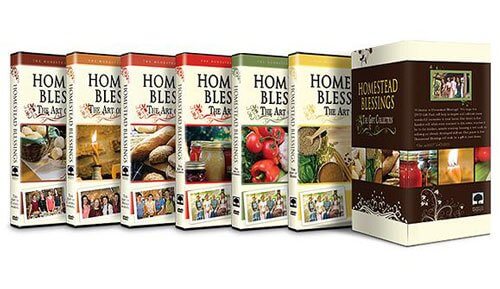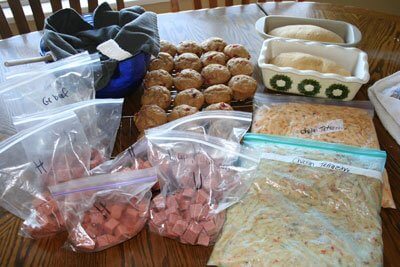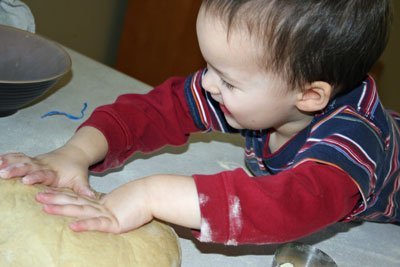Where Food Comes From 101

**Abbie holding fresh carrots, straight from our garden**
What kind of food education are our children getting?
While my husband and I were berry picking a few weekends ago, we got into a discussion about whether kids actually have an idea of where food comes from and how grateful we are that ours have the privilege of being able to be a part of the process, as we tend to our family garden and buy from small, local farmers.
Unfortunately, I believe that for most kids their view of food is nothing more than the unrealistic, seasonless food available at the grocery store. Chicken comes in breast form, skinless, boneless, in a plastic wrapped package. Carrots come in the shape of baby carrots, in a plastic bag with a bunny on the front. Applesauce comes in individually wrapped containers covered in foil. Watermelon and strawberries grow in December. Milk comes in plastic jugs, and fluffy white "wonder" bread doesn't resemble the grains it originated from in the slightest.
In Animal, Vegetable, Miracle Barbara Kingsolver talks about a friend who didn't know that potato plants grow "up" (with the plant portion on the top, and the potatoes growing underground, along the roots). Quite frankly, until two years ago, neither did I. I couldn't have told you what a potato plant looked like or how it functioned in the slightest. I bet I'm not alone.
Children need an agricultural education. Regardless of whether they will be a food producer themselves or whether they will support the food industry through the choices they make and how they spend their dollars. They need to have the experience of visiting a farm, picking food from the ground or off the vine or fruit tree. To see a cow be milked, or to watch eggs be gathered from a hen house. To know that chickens actually walked around with a head, feet, skin, feathers and bones before they became our tasty dinner.
If we cease to offer this kind of education, how will our children ever know how to provide for themselves in a distraught economy? Will they have the confidence or the knowledge to be able to live in a self-sustainable way, especially if the conveniences that we are blessed to have access to are no longer available? If they were to end up in a circumstance where they needed to, would they be able to learn and use the skills necessary to raise their food from the ground up?
Quite frankly, would we have the ability to sustain ourselves? As adults, who have been raised in this era of the Supermarket, what will we do if there ever comes a time when the bounty that we currently know ceases to exist?
How do we give our kids this necessary education in "Where Food Comes From 101"?
- Shop at produce markets or farmers markets. See food that doesn't reside in large grocery stores, in plastic wrap or foil packages. Talk to the farmers and get to know them. Learn about the different seasons, and which foods grow at which times of the year.
- Take field trips to farms, or visit friends who live on hobby or larger farms. Many places offer dairy tours, pumpkin patch hay rides, apple u-pick, honey-bee tours, etc.
- Find more local sources of food for your family, and share these sources with your children. My children come with me to purchase our meat from a small family farm. They've also visited the friends who are organic egg farmers (from whom we purchase our eggs), and have actually walked up to say hi to the chickens. They know that our weekly jars of raw milk come from a cow named Belle who eats green grass in a small town nearby.
- Grow something! There is something tremendous about watching food grow from a seed, to a little seedling, to a larger plant, and end up on your dinner table. There is also enormous ownership involved, and it is such a thrill to children to eat the carrots or potatoes that they helped to grow! It can be as small as a few herbs or some potted peas or tomatoes on your porch, or as large as a backyard garden that helps to feed your family.
- Discuss it with your children as you make food. Ask them where they think it came from, or how it grows? When I've cooked whole chickens in the not-so-distant past, my 4 year old daughter and I have had wonderful discussions about how these chickens used to be alive, how they had heads and feet and feathers. She now knows that our family supports farmers who raise these chickens so that they can be happy and healthy, until they are ready to be killed so that we can eat them as our dinner and that God uses them to help our bodies grow strong. Don't hide the realities of how foods are raised, and the process of how they end up on our table.
Are you concerned about the level of awareness that this generation of children has when it comes to where their food really comes from? What are you doing to give your children a real food education?





Wonderful post, as always. We grew potatoes this year (got a little over 20lbs), and when people would come a visit a trip to the garden was a must. But everyone would always ask “what’s that?”. It was out potatoes….no one knew that they grew tops and some even thought they grew on vines like watermelon…LOL. It was always funny to get peoples reaction. Even to our basil, people are in complete amazment. I have a 2 and 1 yr old. My 2 yr old thinks you can eat grass cause it grows like carrots…at least to her anyway.
This is great and is one of the things I’m looking forward to doing with my kids as they get a bit older. 🙂
We think so much alike LOL. I was JUST talking about this with my husband. In fact, a few days ago we had the opportunity to tour a dairy farm, so we took the kids. The only unfourtunate part is that this particular farm, although the owners were great and the experience was wonderful, apparently the cows only get to go outside on their “break” two months a year! I also prepared my oldest (3) first with non-fiction books about dairy farms (where the cows do go outside!) from the local library. One also mentioned about other mammals that give milk too and that people drink! The library has tons of great books that explain everything how it is made and where it comes from!
I take every opportunity I can to show her how things are grown, and talk about it. Like if we are out in the country I point out different crops and if we are up close I tell her what it is and how it grows. We also have our own garden, and go to pick your own farms or wild picking as well as the farmer’s market. We talk about how things grow and I have several (second hand) kids books on gardens, animals, how things grow etc. to supplement the library.
I never knew how avacodes grew until recently, and brussel sprouts amazed me too! Thankfully my mom had a small garden when I was growing up and took me to pick your own etc. I once heard a story of how children at school were asked where carrots came from and they didn’t know beyond the grocery store. SO sad.
Hope you are doing well, I have been praying for you.
Thank you for addressing this important issue. As I read your thoughts, I realized how unusual it is that my husband and I both grew up in rural areas where growing food was a way of life. Although we now live in the suburbs, I started my own herb garden this year and hope to do more veggies in containers next year. Your post made me realize how intentional I’ll need to be about introducing my daughter to the places that our food comes from.
I grew up in a rural area and my grandparents always had a moderate size farm and all of the grandchildren were required to work on the farm when it was harvest time and then we were sent into the kitchen to help grandma with “putting-up” the harvest! They also had some cattle that he raised for beef and we were always a part of everything that went on. My parents also have always had goats so I grew up with an understanding of all that went into providing nurturing food. But then 9 years ago I married a “city-boy”!! Imagine my shock when I learned of all the things he didn’t know (ex. he didn’t know that pickles are cucumbers!). We decided long ago that our children would grow up learning all of these things. We have a nice sized garden which helps them learn about fruits/veggies, my 5 y/o has milked a cow, we are always talking about things like where eggs come from, where the different types of meat come from, they go to the farmer’s market with me, etc. I couldn’t imagine not having known these things and I can’t imagine my kids growing up and not knowing where their food comes from.
Thank you for this wonderful post!
Yes, as always, such a great and important post Stephanie. Thank you. I was horrified when I learned that my son’s elementary lunch program was fast food once a week. What kind of education are these young children getting about food and nutrition? We now homeschool but it bothers me that as a whole, our culture doesn’t deem food education as necessary for the young children we are nuturing. So indeed, we need to do it in our own homes but there are many children missing out on not only learning about but eating ‘real’ food.
That is one cute picture!
I agree that growing things is one of the best ways to teach your children where their food comes from, even if it’s just growing basil in the kitchen and making pesto with it. I love your other suggestions, too. We also check out books from the library that tell the story about how things grow and how they make their way to the market. I agree that it’s an important lesson, and it seems to help them appreciate “real” food a little more. 🙂
This is an area we’ve also been focusing on in our family. Our three kids come along with us to the farmer’s market on Saturday mornings. They really look forward to it each week. We’ve also been out to a couple farms berry picking and are planning a trip out to visit the farm where we buy our grass-fed beef (and pickup some beef for the freezer). We’ve also got a small container garden growing out back and next year we have plans for a square foot garden.
I knew potatoes grew underground, but I have heard they can be really tough to grow organically. All of my kids learn to count by using the wheat grinder. They count to 10 before it is turned off. Even though they grew up with healthy food choices, we have always opted to buy from the farmer’s market. This is the first year we are trying to grow our own! It’s not as bad as it seems.
I’m so happy to have found your blog. We see eye to eye on so many things! 🙂 I have recently started milling wheat and this has been a real eye opener to me as well as to my children. It is fascinating that what goes in the mill comes out so different and is then used to make yummy food. A few of our wheat berries fell out of the bag and (after a few days of good rain) began to sprout in the driveway. It was an excellent chance to share the “life cycle” of bread with the kids!
It’s very sad, but adults as well as children are greatly disconnected from real food. Having grown up on a farm, I’ve always taken for granted what seems so obvious to me: fruits and vegetables grow outside in the ground, real live animals become meat, and eggs come from the backside of a chicken. However, when I grew up I married a city-boy. I started keeping a garden after we were married and he wouldn’t eat anything from the garden. He was genuinely horrified at the thought of eating something that I had just gone outside to fetch. I couldn’t believe he couldn’t connect the fact that all the produce at the grocery store had been grown outside before it ended up in the neat little rows at the store. He just couldn’t comprehend it for some reason.
Fourteen years later, he will eat some things from the garden, but he still prefers bland, tasteless grocery store tomatoes over fresh grown from the garden. It just boggles my mind.
This is an excellent post!
I often say that there is a disconnect between where food comes from and where we actually buy it. I am glad my kids know how stuff is grown. We buy local and have grown some ourselves.
I planted potatoes for the first time this year and I am not sure who is having more fun digging them up – me or my kids! It is just wonderous and such a blessing to be reconnected with how food is grown after so many years just buying it in the store. I am thankful for the lessons this is teaching our children.
Wow great post and honestly not something I have thought much about. I am not a big gardener but great ideas as we do have a farmer’s market and I have thought many times about taking the kids, thanks so much!